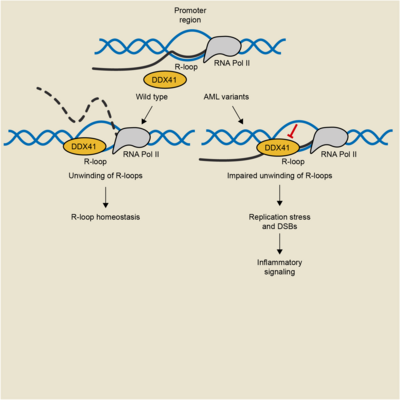A new proteomics method links excess R-loops to DNA double-strand breaks and genomic instability
RESEARCH HIGHLIGHT
19 January - Researchers at the Institute of Molecular Biology (IMB) in Mainz, Germany, have developed a new method to identify proteins that bind to RNA-DNA structures called R-loops. Using this method, they show that a protein called DDX41 is responsible for preventing R-loops from building up in cells, and that this is an important mechanism for preventing genomic instability and cancer. The results were published in the journal Nature Communications.
Our DNA contains all the information necessary for cells to function. It normally exists as a double-stranded helix. So-called R-loops are structures formed when an RNA strand binds to one strand of the DNA, causing the other DNA strand to form a single-stranded ‘loop’. These R-loops are important for regulating gene transcription but unfortunately also increase the risk of DNA damage, which can in turn result in genomic instability and lead to cancer.
To find out how cells balance R-loop formation to permit transcription while also minimising the risk of DNA damage, a team of researchers at IMB comprising the Beli, Roukos, Luke and Barau labs developed a new method called RNA-DNA proximity (RDPRox) proteomics to screen for proteins that associate with R-loops. This allowed them to identify proteins that may be responsible for regulating R-loop levels in human cells.
The researchers identified a protein called DDX41, which is frequently mutated in patients with myelodysplastic syndrome and acute myeloid leukaemia. When the researchers experimentally reduced DDX41 protein levels, they found a dramatic increase in R-loops and double-strand breaks (DSBs) in the cells’ DNA, suggesting that DDX41 is responsible for keeping R-loop levels down. Further analysis showed that this increase in R-loops primarily occurred at the promoters of highly expressed genes, and that many promoters with increased R-loops also showed an increase in DSBs.
The researchers speculate that the accumulated R-loops in DDX41 mutant cells may interfere with DNA replication or transcription, thereby increasing the chances of DSBs and leading to cancer. Prof. Petra Beli, the lead scientist in the project, says “By identifying proteins that are proximal to R-loops in human cells, we showed for the first time that sites of R-loop accumulation coincide with increased DNA fragility.” These findings may also open new therapeutic strategies to treat cancer by inhibiting DNA repair proteins.
Further details
Further information can be found at https://www.nature.com/articles/s41467-021-27530-y
Petra Beli is an Adjunct Director at IMB and a Professor of Biology at Johannes Gutenberg University Mainz. Further information about research in the Beli lab can be found at www.imb.de/beli
Joan Barau is a Group Leader at IMB. Further information about research in the Barau lab can be found at www.imb.de/barau
Brian Luke is an Adjunct Director at IMB and a Professor of Biology at Johannes Gutenberg University Mainz. Further information about research in the Luke lab can be found at www.imb.de/luke
Vassilis Roukos is a Group Leader at IMB. Further information about research in the Roukos lab can be found at www.imb.de/roukos
About the Institute of Molecular Biology gGmbH
The Institute of Molecular Biology gGmbH (IMB) is a centre of excellence in the life sciences that was established in 2011 on the campus of Johannes Gutenberg University Mainz (JGU). Research at IMB focuses on three cutting-edge areas: epigenetics, developmental biology, and genome stability. The institute is a prime example of successful collaboration between a private foundation and government: The Boehringer Ingelheim Foundation has committed 154 million euros to be disbursed from 2009 until 2027 to cover the operating costs of research at IMB. The State of Rhineland-Palatinate has provided approximately 50 million euros for the construction of a state-of-the-art building and is giving a further 52 million in core funding from 2020 until 2027. For more information about IMB, please visit: www.imb.de
About Johannes Gutenberg University Mainz
Johannes Gutenberg University Mainz (JGU) is a globally recognized research-driven university with around 31,500 students. Its main core research areas are in particle and hadron physics, the materials sciences, and translational medicine, while its most outstanding research achievements in the humanities have been attained in the fields of American Studies and Historical Cultural Studies. JGU's academic excellence is reflected in its success in the Excellence Initiative of the German federal and state governments: In 2012, the university's Precision Physics, Fundamental Interactions and Structure of Matter (PRISMA) Cluster of Excellence was approved and the funding of its Materials Science in Mainz (MAINZ) Graduate School of Excellence was extended. Moreover, excellent placings in national and international rankings, as well as numerous other honors and awards, demonstrate just how successful Mainz-based researchers and academics are. Further information at www.uni-mainz.de/eng
Boehringer Ingelheim Foundation
The Boehringer Ingelheim Foundation is an independent, non-profit organization that is committed to the promotion of the medical, biological, chemical, and pharmaceutical sciences. It was established in 1977 by Hubertus Liebrecht (1931–1991), a member of the shareholder family of the Boehringer Ingelheim company. Through its Perspectives Programme Plus 3 and its Exploration Grants, the Foundation supports independent junior group leaders. It also endows the international Heinrich Wieland Prize, as well as awards for up-and-coming scientists in Germany. In addition, the Foundation funds institutional projects in Germany, such as the Institute of Molecular Biology (IMB), the department of life sciences at the University of Mainz, and the European Molecular Biology Laboratory (EMBL) in Heidelberg.
Press contact for further information
Dr Ralf Dahm, Director of Scientific Management
Institute of Molecular Biology gGmbH (IMB), Ackermannweg 4, 55128 Mainz, Germany
Phone: +49 (0) 6131 39 21455, Email: press(at)imb.de
